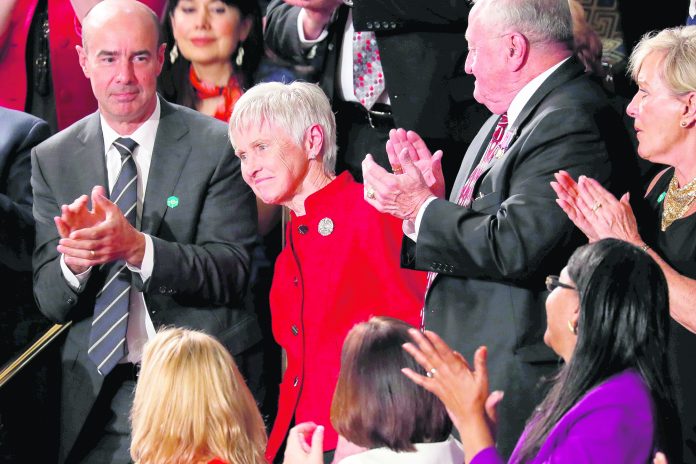
Eugene Scalia has a decades-long record of challenging Labor Department and other federal regulations, as well as a famous last name. The combination proved irresistible to President Donald Trump.
Trump selected Scalia Thursday to be his new labor secretary. If formally nominated and confirmed, he’ll join an administration that has moved aggressively to reverse regulations and work under a president who had repeatedly lauded Scalia’s late father, Justice Antonin Scalia .
The president announced the news on Twitter less than a week after his previous secretary, Alexander Acosta, said he would resign amid renewed criticism of how, as a federal prosecutor, he handled a 2008 secret plea deal with wealthy financier Jeffrey Epstein. The financier was indicted this month on charges of sexually abusing underage girls and pleaded not guilty.
Friday was Acosta’s last day on the job. His deputy, Patrick Pizzella, will serve as acting secretary until Scalia is confirmed.
“Gene has led a life of great success in the legal and labor field and is highly respected not only as a lawyer, but as a lawyer with great experience” working “with labor and everyone else,” Trump wrote.
Scalia, 55, served for a year as the Labor Department’s top lawyer, its solicitor, during the George W. Bush administration. But most of his career has been spent as a partner in the Washington office of the Gibson, Dunn & Crutcher firm, where he has run up a string of victories in court cases on behalf of business interests challenging labor and financial regulations. “Suing the Government? Call Scalia!” was the headline on a 2012 profile by Bloomberg.
His most prominent labor case helped undo an Obama-era rule to put stricter requirements on professionals who advise retirement savers on investments. He also criticized a Clinton-era rule to protect workers from repetitive stress injuries that was ultimately repealed early in the Bush administration. Scalia defended Boeing from a labor union lawsuit and fought on behalf of Wal-Mart against a Maryland law aimed at improving workers’ health care.
Scalia represented the Chamber of Commerce opposing rules requiring mutual fund companies to put independent overseers on their boards of directors, and insurance companies challenging the SEC’s authority to regulate certain annuities with values tied to stocks. Annuities are a sort of hybrid of insurance and investments.
In 2016, he successfully argued for removal of a designation given to insurance giant MetLife by federal regulators that would have brought stricter government oversight. The process of regulators selecting certain large financial companies as “systemically important financial institutions” deemed “too big to fail” was mandated under the 2010 Dodd-Frank Act that overhauled regulation of Wall Street and the banking industry in the wake of the financial crisis.
Scalia’s record drew unqualified praise from the chamber. “He is whip smart and knows the Department’s mission and operations well from prior service as solicitor,” said Glenn Spencer, a senior vice president.
The American Securities Association, a trade association representing investment banks, financial advisers, and wealth managers called Scalia a “fantastic pick.”
Labor and consumer advocates were pessimistic that Scalia would serve their clients’ interest.
“It’s difficult to see how the lawyer who aggressively represented clients against one of the most important retiree protections rules of the Department of Labor in many, many decades is somehow going to flip 180 degrees and become somebody who effectively protects worker and retiree interests,” said Dennis Kelleher, president of Better Markets, a financial industry and government watchdog.
Mary Kay Henry, president of the Service Employees International Union, urged the Senate to reject Scalia. “The last thing working people need is another Secretary of Labor who sides with corporate CEOs instead of hard-working Americans and makes it harder to join together in unions,” Henry said on Twitter.
If Trump was attracted to Scalia’s record, he also has made no secret of his fondness for the Scalia family.
Eugene Scalia accompanied his mother to Trump’s first speech to a joint session of Congress in February 2017, where they sat in a box for the president’s guests. She received a standing ovation when Trump introduced her. Maureen Scalia also was on hand at the White House when Trump announced both of his Supreme Court nominees, Neil Gorsuch and Brett Kavanaugh.
During the presidential campaign, Trump repeatedly praised the justice, who died in February 2016, and said, “I am looking to appoint judges very much in the mold of Justice Scalia.” Last year, Trump posthumously awarded the justice a Presidential Medal of Freedom, and Maureen Scalia was again at the White House to receive it. He remarked how Maureen Scalia had become a great friend to the Trump family and himself.
When Bush nominated Eugene Scalia as the Labor Department solicitor, unions howled in protest and Senate Democrats refused to hold a confirmation vote. Bush gave him a temporary, recess appointment to the job.
Even with strong Democratic opposition again, he has a clear path to confirmation in a Senate controlled by Republicans and stripped of the procedural requirement that nominees need 60 votes to proceed.
He would be reunited in Trump’s Cabinet with two former bosses. Elaine Chao, now the transportation secretary, was head of the Labor Department when Scalia worked there. For a time he was special assistant to Attorney General William Barr, during Barr’s first stint in charge of the Justice Department in the early 1990s.q
___



















